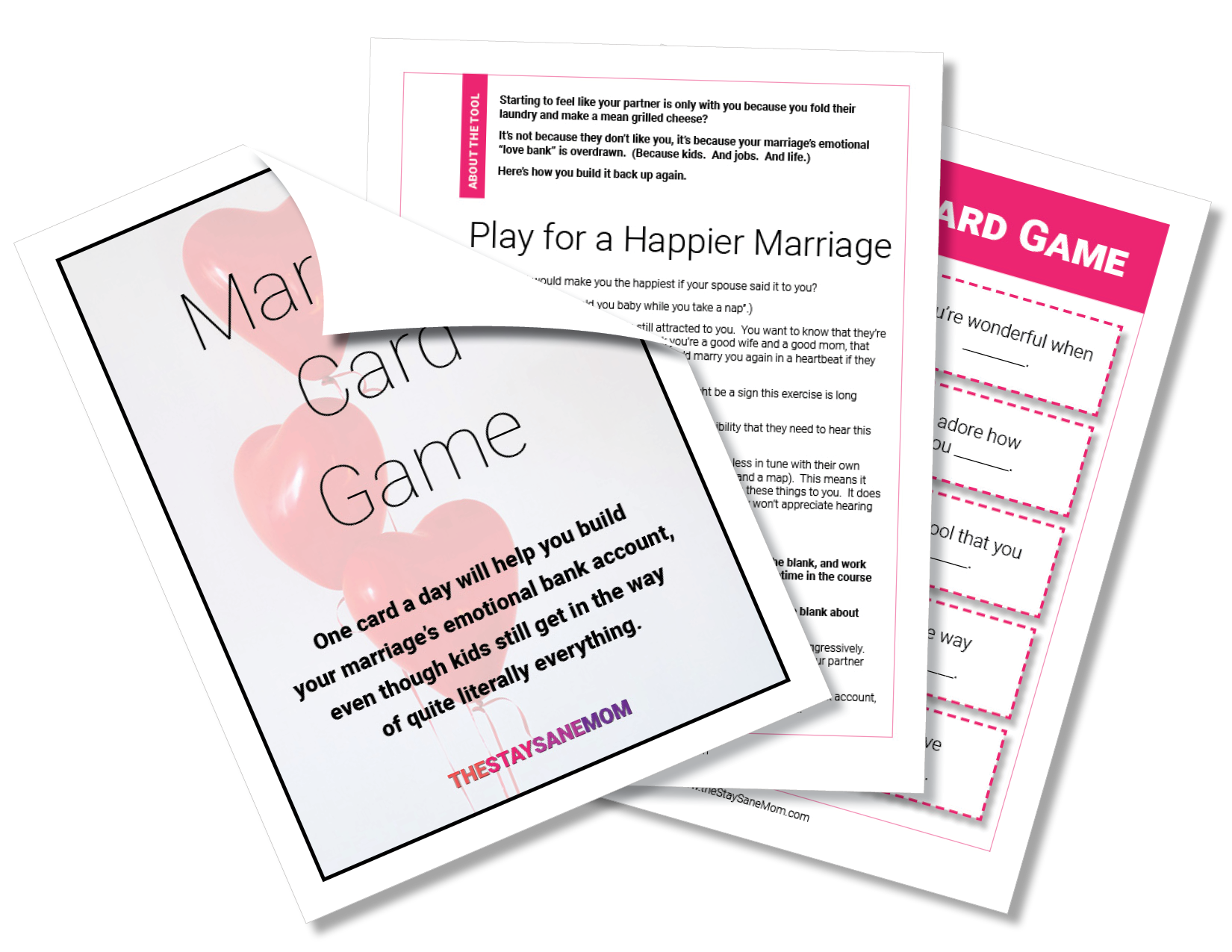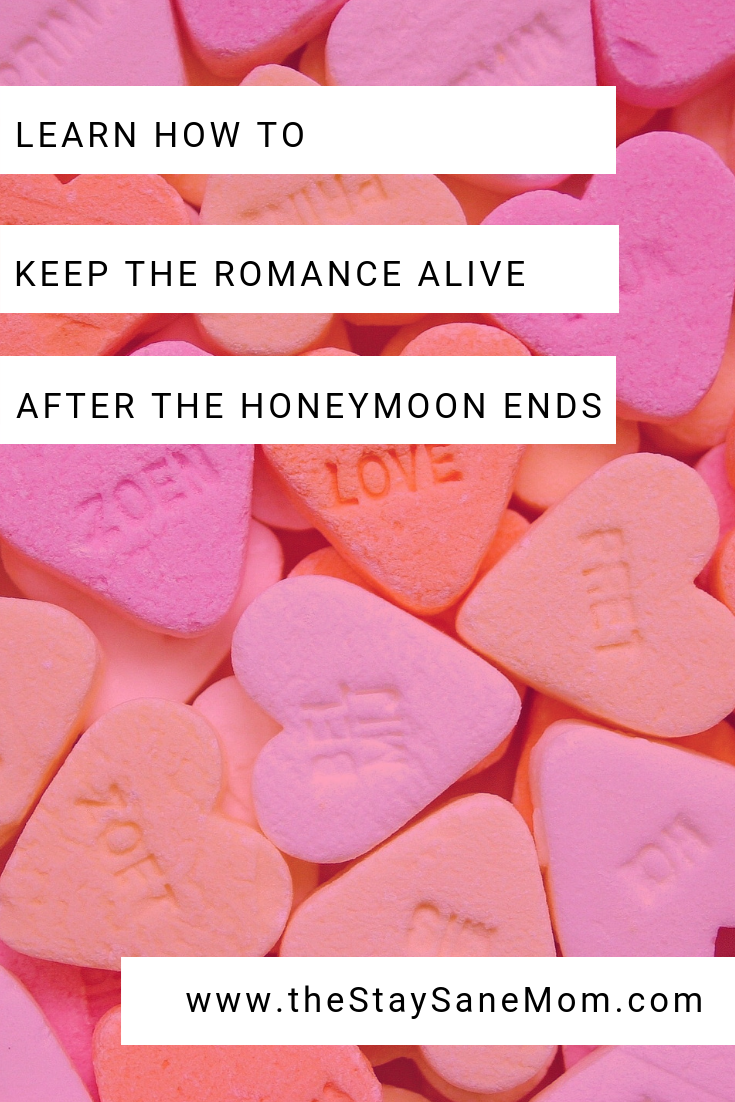How to Keep Romance Alive when the Honeymoon Phase Ends

How to Keep Romance Alive when the Honeymoon Phase Ends
It's easy to be romantic when you first get together, but after years of marriage, kids, jobs, and everything else life throws at you it gets a lot harder.
Written by Liz Bayardelle, PhD | See Comments | Updated 12/09/2018
Want to cut to the chase?
Marriage Building Card Game

Want to cut to the chase?
Marriage Building Card Game
Get the Free Printable Deck of Cards Now
Get it NowHow to Keep Romance Alive when the Honeymoon Phase Ends
This post contains some affiliate links for your convenience. Click here to read my full disclosure policy.
A Slight Problem (to Put it Mildly)
How many of the following scenarios can you relate to?
- You and your partner do "peck" kisses at least three times as often as you make out
- You can't remember the last time you watched an entire movie in one sitting without one of you being unconscious for at least 30 minutes of it
- You have popped a pimple or tweezered an ingrown hair for your spouse in the last 30 days
- One of you (okay, it's you) has a toddler/baby bump/infant/gremlin clinging to you at least 12 hours a day and it literally gets between you and your spouse (ours is fond of yelling 'no, my mommy!' and divebombing our hugs)
- You can describe your spouse's bathroom routine and schedule in detail
- Between jobs, kids, family obligations, and other stressors your definition of "couple time" involves mutual unconsciousness in the same physical location
- Physical intimacy must be scheduled and planned with at least 12 advance notice
- You bring up "romance" and your partner snortlaughs and walks away
Did you raise your hand for any of those situations? Maybe you pulled a first-year-Hermione and waved it in the air a bit? Yeah...me too.
Congratulations, you're married with kids.
The "Good Old Days"
When people are dating, they think all the crazy, dimwitted, moronic habits of their newly-acquired partner are absolutely adorable.
Isn't it cute that he can't remember to turn off lights or shut drawers? He's just so intelligent he can't keep his mind on the mundane day-to-day stuff!
I love the way he's so rugged! His beard is soooo hot!
The psychological term for this stage of a relationship is "limerence". It's that early phase of a romantic relationship where you think your partner walks on water. Otherwise known as "the honeymoon period", "crushing on each other", or "disgusting to watch" (for those of us who have to stand behind you in line at an amusement park), this phase involves a crazy amount of admiration (even for the dumb stuff no one should ever admire) as well as a truly unproductive level of sexual attraction.
Unfortunately, like the energy of a toddler or the metabolism of a teenager, good things never last.
Where Did That Fondness Go Again?
So you married someone who was so lofty and intellectual that they shunned the banalities of human existence, but now you're stuck with someone who just can't seem to put his shoes away to save his soul. You married a sexy, bearded wildman, but now you're trapped next to someone who could really just please wear a little more deodorant, thanks.
I'm not sure if this will help or hurt, but it's likely your spouse didn't change. Neither did you. The lovely "limerence" period in which your partner can do nothing wrong lasts an average of 2 years.
Ironically, this is the amount of time it usually takes people to go from dating to married, so just as you tie the knot, your magical romance blinders fall away to reveal the people both of you actually were all along.
Gee thanks.
Spoiler Alert: At the end of this post, I'm going to give you a free printable marriage game that will help bring back that feeling of love, admiration, and fondness you used to have two kids, a half a decade, and approximately 8,451 diaper changes ago.
And Where Does That Leave Us?
This means that, once the magical honeymoon period ends, you actually have to put in work to get the same amount of "warm fuzzy" feelings you got automatically when you first started dating.
Now, before you start ranting and raving about how marriage is a trick, let me point out that this is actually not an unprecedented phenomenon.
Think about when you first start working out to lose weight. The first few weeks or months the pounds just seem to fly off. Your exercises are still fun, you can't get enough of your new diet (because, hey, it's working finally), and you're happy as a clam. Then, slowly but surely, as time progresses it becomes harder and harder to make the same change in the scale. Your classes start to feel dull and boring. And you would literally murder someone for a single french fry.
This doesn't mean that you should go back to binge-watching Netflix with your quivering snout buried eyeball deep in a bag of Doritos, it just means you need to double down on your effort, make some smart decisions about how to progress from here, and switch from a "sprint" mentality to a "what's sustainable in the long term" mentality.
It's the exact same process with marriage.
A Bad Metaphor and a Better One
Just like your physical muscles have to be built slowly by repeated use, your "romance" muscles have to be built slowly by repeated use.
(Please don't make that dirty, guys. I'm trying to be uplifting here.)
Okay, you know what? Let's call it building up our "emotional bank account" balance. Good luck making that dirty and it's actually another concept from the Gottman method.
Think of those feelings of fondness, admiration, love, and respect for your partner as commodities. Commodities can be either added or subtracted from the value of your marriage's emotional bank account.
When good things happen (i.e. you go on a fantastic date, your partner complements how well you handle a toddler tantrum and praises your parenting skills, he walks in on you with 249% bedhead and calls you beautiful anyway, etc.) they add to your marriage's emotional bank account.
When bad things happen (i.e. you go for days without seeing your spouse due to work schedules, you have to deal with a strenuous situation with the teenager and both get cast as the bad cop, you are forced to share a bathroom with another adult human who discovers you have *gasp* bodily functions, etc.) it subtracts from your marriage's emotional bank account.
This is the basic structure for your level of happiness in your marriage.
When there's a healthy balance in your account, you both feel relatively good, secure, and taken care of in your marriage. When you get low or even negative balances in your account, you begin to fight, develop resentment, and feel generally unhappy in your marriage.
How to Build Your Emotional Bank Account Balance
The initial honeymoon phase gives you a crazy, unsustainable starting balance in your emotional bank account. It's like an 18 year old happening to win the lottery on their first day of a new job. They don't really need to think about their cash flow for a while, because they have so much money to spare it doesn't really matter if they put in overtime or not.
Then, slowly but surely, the initial boost begins to dwindle and you start to see what "real life" marriage is going to be like.
That's when the "marriage is hard work" thing everyone told you about starts to make a lot more sense.
However, have no fear. There is actually a simple way to keep your romance alive even after the honeymoon period ends.
Dr. Gottman includes this issue in the second of his Seven Principles of Making Marriage Work. He refers to it as "building fondness and admiration", but I would like to describe it more simply as "remember to say nice stuff".
This is, of course, a gratuitous oversimplification, so let's go through it in a tiny bit more detail before we get to the free marriage game I promised.
How to Say Nice Stuff
Let's think about this one from your perspective for a second. What would make you the happiest if your spouse said it to you?
(No, your answer can't be "let me hold you baby while you take a nap".)
You probably want to hear that your spouse is still attracted to you. You want to know that they're proud of how you're handling your life, that they think you're a good wife and a good mom, that they still like your fundamental personality, and that they'd marry you again in a heartbeat if they could do it all over again.
Small hint: if you almost cried reading that paragraph, it might be a sign this exercise is long overdue.
If that's what you'd love to hear from your spouse, isn't it a possibility that they need to hear this stuff from you too?
Now, men are irritatingly gruff, horrible with emotion, and generally less in tune with their own feelings (read: couldn't find an emotion with two hands, a flashlight, and a map). This means it will be harder to garner a reaction than it would be if they were saying these things to you. It does NOT mean that they do not need to hear them. It does NOT mean they won't appreciate hearing them and in a big way.
Your Present (and Assignment)
Attached to the end of this blog is a free, printable deck of cards with 31 fill in the blank statements, one on each card. These are things like "I'm so proud of how you _____".
Your assignment for the next month is to choose one card per day, fill in the blank, and work the statement into conversation (or text messages) with your spouse sometime in the course of the day.
Do not expect anything in return. Do not say it passive aggressively. This is about conveying genuine and honest admiration, respect, and fondness for your partner without expecting anything in return.
So What's In It for Me?
Yes, this is the hardest question when it comes to marriage. How is it fair if I'm doing all this work and my spouse doesn't seem to care, isn't working as hard as I am, or doesn't even notice.
Let me pass on to you the most irritatingly true piece of advice I got before I got married.
My father sat me and my husband (then fiance) down and told us that in marriage your only score was a group grade. It doesn't matter if you do 10% of the work or 90% of the work, because the only grade you get is as a group.
This irritated the living crap out of me. As a die-hard, academic swot I was personally offended on like nineteen different levels. (I hate group projects with a fiery passion.) As someone with an overdeveloped sense of justice, I bucked against the unfairness of a situation where it didn't matter if you did more (or less) work than your partner.
Unfortunately, he was dead right.
In marriage, no one cares who puts in the work because if you contribute to your marriage's emotional bank account, it will make both of your lives better. If you make your spouse feel loved and cared for, they will be happier and (in turn) it will make your marriage a more pleasant environment for you as well.
Small-Yet-Essential Exception: In cases of abuse (emotional or physical) or in marriages that have truly stopped functioning as a team, you don't want to be the only one putting in effort. If you feel your marriage falls into this category, this approach might be like giving Tylenol to someone with leukemia. This advice is for mostly-healthy marriages who need a boost, not marriages in dire trouble who need more serious help. You most likely know it if this applies to you.
The Sum-Up
With that addendum aside, try to put a pin in the question of "what's in it for me" and devote 31 days to contributing selflessly into your marriage's emotional bank account. Most likely, even the most oblivious spouses will notice something is happening and begin reciprocating in kind after a week or so.
If you think your spouse would be receptive, you can even share the deck and each pick a card each day. Making it a couples game is not only way more fun, but it will also double the number of contributions into your joint bank account.
After 31 days, let me know how this works for you! When did your spouse catch on and start reciprocating? How did the exercise change things? Leave a comment so others can benefit from your experience!
Start Your Next Step
Marriage Building Card Game

Start Your Next Step
Marriage Building Card Game
Get the Free Printable Deck of Cards Now
Get it NowGet Sanity, Delivered to Your Inbox.
Care to Share?




About the Author

Liz Bayardelle, PhD
Founder | Contributor
Liz (or Dr. Mommy, as her toddler started calling her after learning what a PhD was) is the happily sleep-deprived mom of a toddler (and professional raccoon noise impersonator), a sparkle-clad kidnado, a teenage stepdaughter, 200 cumulative pounds of dog, and herd of dustbunnies (if daily vacuuming doesn't occur). During nights and naptimes, she uses her PhD in business psychology as an author, speaker, and consultant. She also serves as an executive and principal for three companies, two of which she co-founded with her very patient (and equally exhausted) husband.





